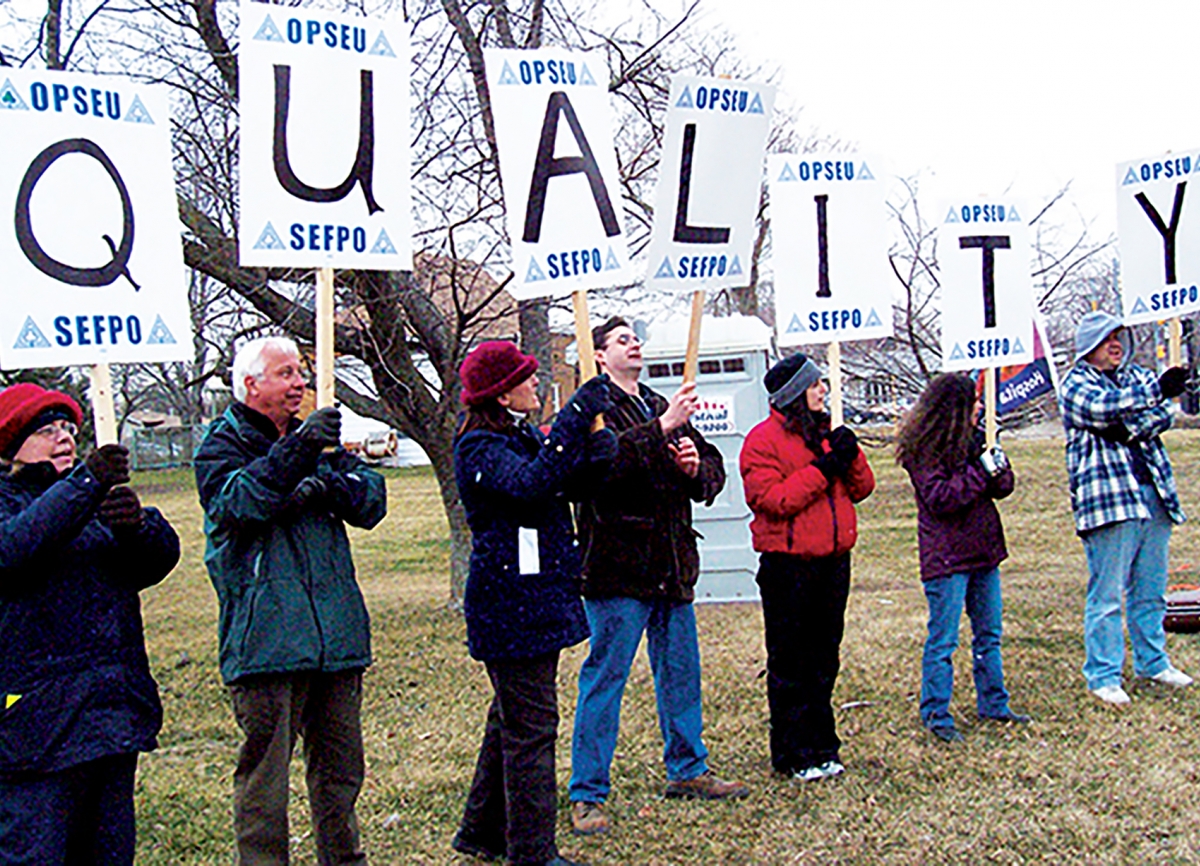
Today, both the union representing faculty members at Ontario’s two dozen colleges and the collective management of those schools have launched the public relations battle leading up to a possible strike by instructors in mid-October.
Again, the existing contract between the two sides does not expire until this Sunday (September 30th), and the two sides are continuing to negotiate between then and now …
… But talks have not been going at all well, so the possibility of a work-stoppage is looming.
Rather than republishing the info, The Scene is simply supplying links to these two websites:
The Ontario Public Sector Employees Union: https://opseu.org/information/college-faculty-bargaining-questions-and-answers-students
and
The College Employer Council: https://thecouncil.on.ca/articles/1597
Stay tuned.
PREVIOUSLY PUBLISHED COMMENTARY
OPSEU:
Following the strong strike vote by college faculty last week, your union bargaining team returned to the table this week ready to bargain in good faith and move negotiations forward to a fair settlement. Unfortunately, the College Employer Council continued their refusal to engage in meaningful discussions.
We hoped that our successful lobby day at Queen’s Park on the heels of faculty’s strong strike mandate vote would cause the Council to see bargaining in a different light. It did not.
As a result, your college faculty bargaining team has asked the conciliator to issue a “no-board” report, a move that will increase pressure on the employer by taking the next step toward a legal strike or lockout position.
Under the Colleges Collective Bargaining Act (CCBA), either party can request a no-board report, which is typically issued within a few working days of the request. From there, workers can strike, or their employer can lock them out, 16 days later.
Depending on what day the no-board report is issued, faculty and the colleges will be in a legal strike or lockout position in the week following Thanksgiving Day.
This does not mean the faculty team has set a strike deadline. Under the CCBA, the union must give five days’ notice of a strike and the employer must give five days’ notice of a lockout. If we are approaching a legal strike or lockout position and bargaining is progressing, we will continue bargaining. Your team remains committed to getting a deal, first and foremost.
To that end, and in an effort to trigger real negotiations, the faculty team made significant moves in bargaining this week. Unfortunately, the College Employer Council continues to reject the basic principles of equity and fairness or to even engage in discussions on key faculty demands. It is clear that their proposals would entrench the inequities in our collective agreement and that they are set on abdicating their responsibilities for equal pay for equal work under Bill 148.
The point of asking for the no-board is to change this. It is our hope that moving forward in this fashion will make our employer see that our members understand that, in order to settle this at the bargaining table, council has to begin engaging in constructive negotiations.
THE COLLEGE EMPLOYER COUNCIL:
After two days of bargaining last week, the union requested that the Ministry of Labour start the strike timetable. Strike action by the union could start as early as October 16th.
A strike is unnecessary and would be disruptive to students. The union repeatedly stated that the strike vote was to encourage bargaining. Yet, starting the strike timetable puts the college system on the clear path to a strike.
The colleges’ offer is an extension of the existing contract. It includes:
• A 1.5% retroactive increase on April 1, 2017 resulting in a retroactive payment of up to $800, and
• A signing bonus of $500 for full-time faculty and $250 for partial load paid.
If the extension offer is not agreed to before it expires, these two provisions will be lost.
Employees deserve the opportunity to vote on the extension agreement. As the bargaining agent for faculty, the union has the legal right to call for an offer vote at any time. The colleges have told the union that if it agrees by September 29 to hold a vote, the colleges will extend the offer of settlement to allow the Ministry of Labour to schedule the vote.
The offer extends the existing contract and does not include any concessions. The union’s claim that the colleges are demanding concessions is untrue. There are no concessions – only enhancements.
In addition to the retroactive increase and signing bonus, the colleges’ offer provides an investment in faculty with:
• a 7.5% salary increase over four years (1.5%, 2.0%, 2.0%, 2.0%)
• new maximum salary of $115,094 will be in place by October 1, 2020
• expanded catastrophic drug coverage
• positive changes to pregnancy and parental leave.
The colleges have told the union they remain available to meet throughout the week of September 25. The union has not made any changes to its proposals, which would eliminate 4,280 contract faculty jobs, increase costs by $400 million annually, change the governance of colleges, and restrict the colleges from overseeing academic delivery. From the start of bargaining, the colleges have been clear to the union that these proposals are not the basis for a settlement.
Employees deserve the opportunity to vote on the extension offer. Faculty should speak to local union leaders and the union bargaining team. Ask them to let faculty vote on the colleges’ extension offer.







